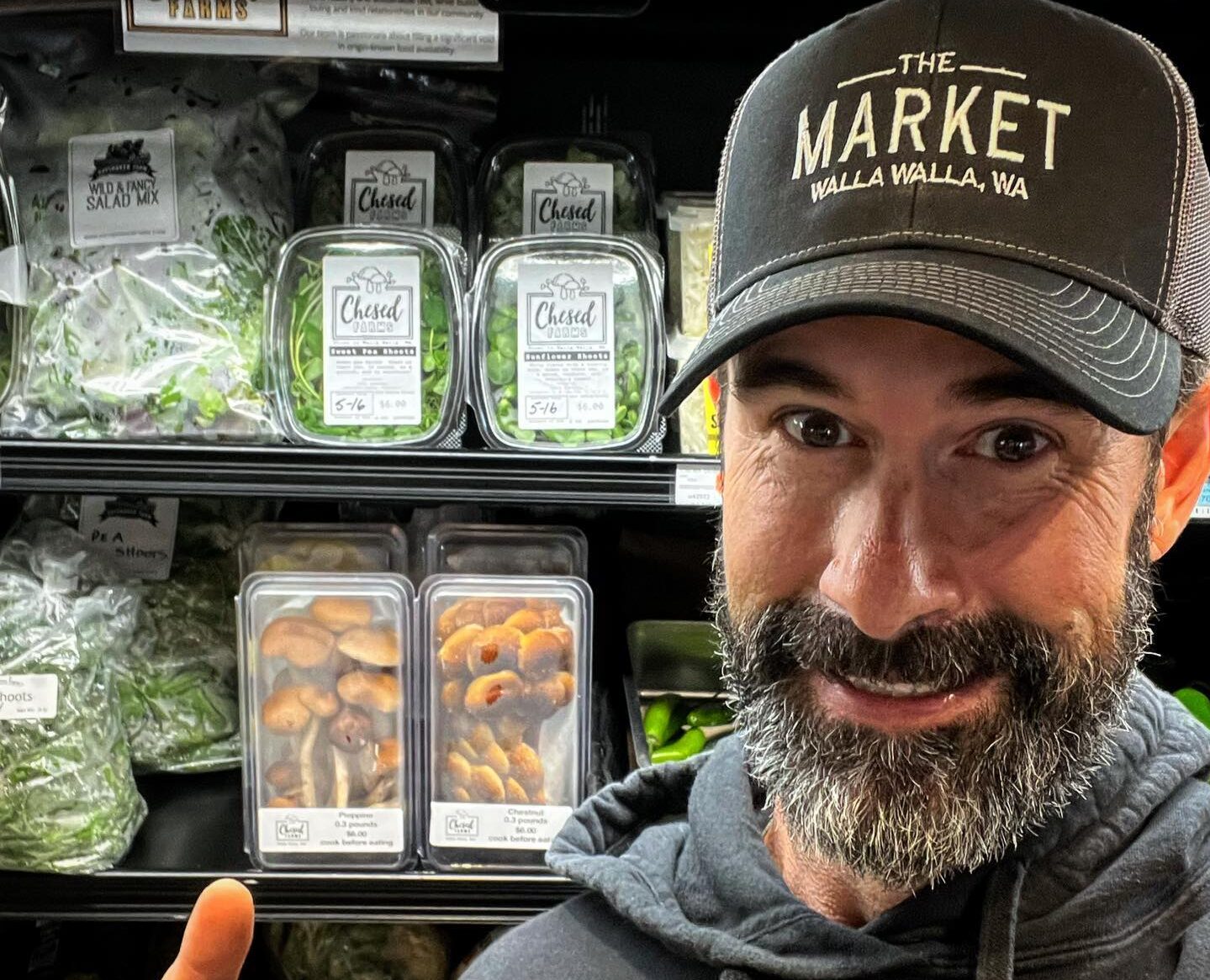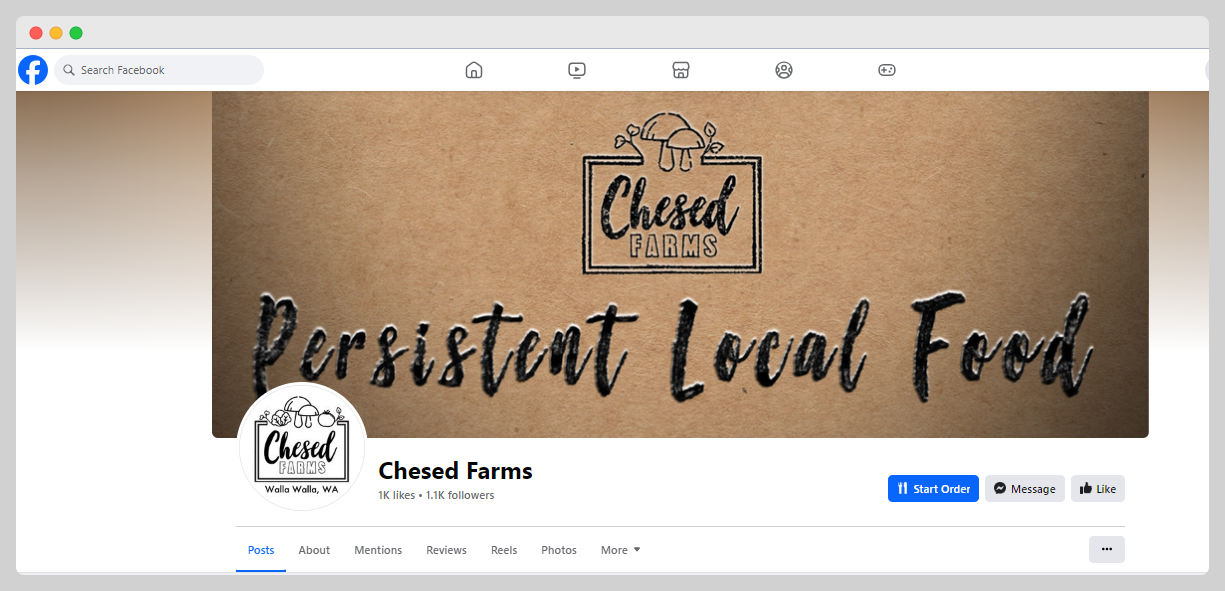How Two Entrepreneurs Grew a $250K Local Food Business in 5 Years
Who is Sundown Hazen?
Sundown Hazen co-founded Chesed Farms in Walla Walla, Washington after working diverse jobs ranging from Apple Store employee to UPS worker; he had minimal farming experience but a strong passion for local, sustainable food sources.

What problem does Chesed Farms solve?
Chesed Farms enables local communities to access fresh, sustainable, and premium mushrooms by eliminating long supply chains, thereby offering a healthier, eco-friendly, and superior food option. Given the increasing consumer demand for high-quality, locally-sourced produce, Chesed Farms meets a vital need while supporting local economies and promoting environmental sustainability.
How did Sundown come up with the idea for Chesed Farms?
Jonathan and Sundown were both struck by the limitations of having fresh, local, and sustainable food sources in Walla Walla, Washington. They noticed the lack of a significant mushroom grower in the area, despite the high demand from local restaurants and health food grocers. This gap in the market prompted them to consider mushroom farming as a viable business opportunity.
Before fully diving in, they engaged in thorough research, including testing different growing methods and visiting local restaurants to understand their needs. They also sought validation by consistently selling their initial small batches quickly, which proved there was a strong local demand for gourmet mushrooms.
Throughout this process, they faced significant challenges, including fumbling through initial trials and adapting to the COVID-19 pandemic's restrictions. Each setback provided critical lessons in persistence and flexibility, which helped refine their approach and solidify their business plan. Their dedication to building strong community relationships aligned with the core value behind the name "Chesed" — embodying loving-kindness through their sustainable farming efforts.
How did Sundown build the initial version of Chesed Farms?
Chesed Farms' co-founders, Sundown Hazen and Jonathan Garrett, initially converted a section of their garage into a mushroom farm with an initial investment of $5,000, using recycled materials to keep costs low. They built insulated walls and used mini split systems to control the climate. The core process involved preparing a substrate mix of oak sawdust and oat pellets, filling bags, and inoculating them with mycelium culture. Two months of testing and iterating allowed them to scale from a small garage setup to leasing a 4,000-square-foot warehouse, greatly increasing their capacity. The journey was fraught with initial failures and learning curves, but leveraging local funding options and their own persistence, they quickly adapted and optimized their setup, ensuring a streamlined production from preparation to harvest.
What were the initial startup costs for Chesed Farms?
- Warehouse Build-Out: Chesed Farms took a small loan from Craft3 to fund materials and equipment to build out a 4,000 square foot leased warehouse space.
- Initial Setup: Chesed Farms converted a three-car garage into a mushroom farm with an investment of $5,000.
How did Sundown launch Chesed Farms and get initial traction?
Grassroots Social Media Campaign
Chesed Farms started by leveraging social media to get the word out about their gourmet mushrooms. They focused on platforms like Facebook, where they actively posted updates about their farming processes, the benefits of their mushrooms, and their commitment to sustainability. This helped build a local following and created a sense of community around their brand.
Why it worked: The social media campaign was effective because it allowed Chesed Farms to directly engage with potential customers in a community-oriented way, without any advertising costs. It also helped them keep their audience updated on new products and delivery schedules.
Metrics:
- They started selling in mid-May 2020.
- Their social media efforts contributed to filling orders and selling everything they produced during the initial period of COVID-19 restrictions.
- Within a few months, they consistently sold out all their produce.
Free Delivery Service
With the cancellation of the local farmer’s market due to COVID-19, Chesed Farms pivoted by offering free delivery in Walla Walla and College Place. They even used bicycles for these deliveries, emphasizing their zero carbon emission goal and enhancing their local, eco-friendly image.
Why it worked: The free delivery service was a practical solution given the global pandemic restrictions. It also reinforced their commitment to sustainability, resonating well with the eco-conscious demographic in their community.
Metrics:
- This approach enabled them to immediately reach local customers who were confined to their homes.
- They saw a high demand and consistently sold everything they grew.
Direct Sales to Local Businesses
The founders personally approached local health food stores and high-end restaurants to introduce their gourmet mushrooms. They targeted restaurants known for valuing local produce by researching their menus and social media to find potential buyers who might be interested in locally grown gourmet mushrooms.
Why it worked: Direct face-to-face interaction allowed them to build relationships with key decision-makers, such as chefs and produce managers, who valued fresh, local ingredients. This also provided immediate feedback and helped them refine their offering to meet local demand better.
Metrics:
- By mid-2020, they had built a solid customer base, including local health food grocers and high-end restaurants.
- The result was that they consistently sold all their produce and saw demand exceeding their initial supply.
These tactics allowed Chesed Farms to establish a strong local presence and build a loyal customer base even during challenging times, setting a strong foundation for future growth.
What was the growth strategy for Chesed Farms and how did they scale?
Facebook and Instagram
Chesed Farms leveraged Facebook and Instagram to build an audience of potential customers. They used these platforms to engage with the local community, share their journey, and showcase their products. They would often post pictures of their mushrooms, updates from the farm, and the benefits of their produce.

Why it worked: Consistent posting helped them to build a loyal following who were interested in their fresh, sustainable produce. This approach allowed them to reach local customers effectively, who valued local food sources, especially during the COVID-19 pandemic when in-person shopping was limited. Their engaging content, like pictures and stories of their mushrooms, made followers feel connected to the farm and its mission.
Farmer’s Markets
Chesed Farms sold their mushrooms directly to consumers at local farmers' markets, such as the Walla Walla Downtown Farmers Market. This direct sales channel was crucial during their initial growth phase, especially when other avenues were shut down due to COVID-19.
Why it worked: This face-to-face interaction allowed Chesed Farms to build personal relationships with their customers, educate them about their products, and get immediate feedback. It’s also an excellent way for customers to see and try the products firsthand, which builds trust and loyalty.
Public Relations and Local Media
Chesed Farms used local media to their advantage, receiving coverage from regional public stations like Blue Mountain Television and local newspapers. They also got featured on local news segments which highlighted their unique business model of bicycle delivery during the pandemic.
Why it worked: Local media exposure increased awareness about Chesed Farms within the community. Being featured on TV and in the newspaper lent credibility to their business, making new customers more willing to try their products. It also spread their story to people who might not be active on social media.
Subscription Program
They implemented a subscription program for mushrooms, offering half-pound or full-pound mixed orders. This ensured a steady revenue stream and helped them manage supply better.
Why it worked: The subscription model provided them with consistent income and allowed customers to try different varieties of mushrooms regularly. This helped Chesed Farms build a loyal customer base who looked forward to their deliveries. It also facilitated more efficient logistics and delivery planning, making the operation smoother and more cost-effective.
What's the pricing strategy for Chesed Farms?
Chesed Farms offers gourmet mushrooms at an average price of $18 per pound, with additional free local delivery options to encourage customer engagement and convenience.
What were the biggest lessons learned from building Chesed Farms?
- Adapt Quickly: Chesed Farms launched just as COVID-19 hit, disrupting their initial plans for a farmer's market debut. They quickly adapted by using social media and offering home delivery, even by bicycle, to reach customers.
- Leverage Partnerships: Collaborating with local businesses and leveraging resources from organizations like Craft3 helped Chesed Farms scale operations and increase production. This partnership approach ensured steady growth and access to new opportunities.
- Stay Resilient: Despite early failures in growing mushrooms and the challenges imposed by the pandemic, Chesed Farms remained persistent. Their dedication and problem-solving attitude helped them overcome these hurdles and stabilize their business.
- Customer Relationships Matter: Direct communication and relationship building with customers were vital. By consistently updating customers and ensuring product quality, Chesed Farms fostered trust and loyalty, which proved crucial for their sustained success.
- Continuous Learning and Adapting: Utilizing resources like YouTube for ongoing education, Chesed Farms continuously improved their methods. They also learned from their mistakes and innovations, like offering "ugly but tasty" mushrooms, to maximize sales and reduce waste.
Discover Similar Business Ideas Like Chesed Farms
Latvian coffee roasting company grew from a team of 2 to 13, with a current monthly turnover of €80k, driven by word-of-mouth marketing, sustainable practices and developing accessible products for the specialty coffee market.
How a couple started from a humble weekend market stall in East London to building a Thai food restaurant empire with 18 sites across the UK, now with run rate revenues of over $25mil per year, by combining homely authentic Thai food with local ingredients in a casual cafe environment.
More about Chesed Farms:
Who is the owner of Chesed Farms?
Sundown Hazen is the founder of Chesed Farms.
When did Sundown Hazen start Chesed Farms?
2020
What is Sundown Hazen's net worth?
Sundown Hazen's business makes an average of $16.7K/month.
How much money has Sundown Hazen made from Chesed Farms?
Sundown Hazen started the business in 2020, and currently makes an average of $200K/year.

Download the report and join our email newsletter packed with business ideas and money-making opportunities, backed by real-life case studies.

Download the report and join our email newsletter packed with business ideas and money-making opportunities, backed by real-life case studies.

Download the report and join our email newsletter packed with business ideas and money-making opportunities, backed by real-life case studies.

Download the report and join our email newsletter packed with business ideas and money-making opportunities, backed by real-life case studies.

Download the report and join our email newsletter packed with business ideas and money-making opportunities, backed by real-life case studies.

Download the report and join our email newsletter packed with business ideas and money-making opportunities, backed by real-life case studies.

Download the report and join our email newsletter packed with business ideas and money-making opportunities, backed by real-life case studies.

Download the report and join our email newsletter packed with business ideas and money-making opportunities, backed by real-life case studies.

